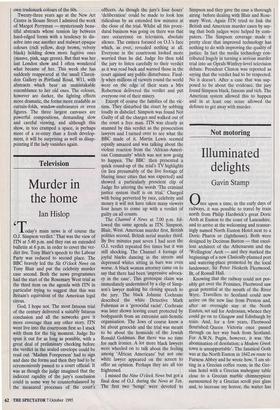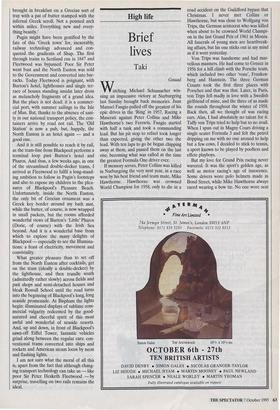Not motoring
Illuminated delights
Gavin Stamp
0 nce upon a time, in the early days of railways, it was possible to travel by train north from Philip Hardwick's great Doric Arch at Euston to the coast of Lancashire, and to arrive at the welcoming and reassur- ingly named North Euston Hotel next to a Doric Pharos or (lighthouse). Both were designed by Decimus Burton — that excel- lent architect of the Athenaeum and the 'Wellington' Arch — and they marked the beginnings of a new Clasically-planned port and watering-place promoted by the local landowner, Sir Peter Hesketh Fleetwood, Bt, of Rossall Hall.
Knowing that the railway could not pos- sibly get over the Pennines, Fleetwood saw great potential at the mouth of the River Wyre. Travellers to Scotland could now arrive on the new line from Preston and, after an overnight stay at the North Euston, set sail for Ardrossan, whence they could go on to Glasgow and Edinburgh by train. And, for a few years, Fleetwood flourished: Queen Victoria once passed through on her way back from Scotland. For A.W.N. Pugin, however, it was 'the abomination of desolation; a Modern Greek town is unsupportable'. The fanatical Goth was at the North Euston in 1842 en route to Furness Abbey and he wrote how, 'I am sit- ting in a Grecian coffee room, in the Gre- cian hotel with a Grecian mahogany table close to a Grecian marble chimneypiece surmounted by a Grecian scroll pier glass and, to increase my horror, the waiter has brought in breakfast on a Grecian sort of tray with a pat of butter stamped with the infernal Greek scroll. Not a pointed arch within miles. Everything new and every- thing beastly.'
Pugin might have been gratified by the fate of this 'Greek town' for, inexorably, railway technology advanced and con- quered the gradients of Shap. The first through trains to Scotland ran in 1847 and Fleetwood was bypassed. Poor Sir Peter went bust and the North Euston was sold to the Government and converted into bar- racks. Today Fleetwood is poignant, with Burton's hotel, lighthouses and single ter- race of houses standing amidst later dross as melancholy fragments of a grand idea. But the place is not dead: it is a commer- cial port, with summer sailings to the Isle of Man. But, thanks to the absence of sani- ty in our national transport policy, the con- tainers arrive by road not rail. The 'Old Station' is now a pub, but, happily, the North Euston is an hotel again — and a good one.
And it is still possible to reach it by rail, as the tram-line from Blackpool performs a terminal loop past Burton's hotel and Pharos. And thus, a few weeks ago, in one of the streamlined double-decker trams, I arrived at Fleetwood to fulfil a long-stand- ing ambition to follow in Pugin's footsteps and also to expose my children to the plea- sures of Blackpool's Pleasure Beach. Unfortunately, inside the North Euston, the only bit of Grecian ornament was a Greek key border around my bath mat, while the butter, of course, is now wrapped in small packets, but the rooms afforded wonderful views of Burton's 'Little' Pharos (Doric, of course) with the Irish Sea beyond. And it is a wonderful base from which to explore the many delights of Blackpool — especially to see the Illumina- tions: a feast of electricity, movement and conviviality.
What greater pleasure than to set off from the North Euston after cocktails, get on the tram (ideally a double-decker) by the lighthouse, and then trundle south (admittedly rather slowly) across fields and past shops and semi-detached houses and bleak Rossall School until the road turns into the beginning of Blackpool's long, long seaside promenade. At Bispham the lights begin: illuminated displays of sublime com- mercial vulgarity redeemed by the good- natured and cheerful spirit of this most awful and wonderful of seaside resorts. And, up and down, in front of Blackpool's sawn-off Eiffel Tower, fantastic vehicles grind along between the regular cars: con- ventional trams converted into ships and rockets and American steam locos by neon and flashing lights.
I am not sure what the moral of all this is, apart from the fact that although chang- ing transport technology can take us — like poor Sir Peter Hesketh Fleetwood — by surprise, travelling on two rails remains the ideal.











































































 Previous page
Previous page